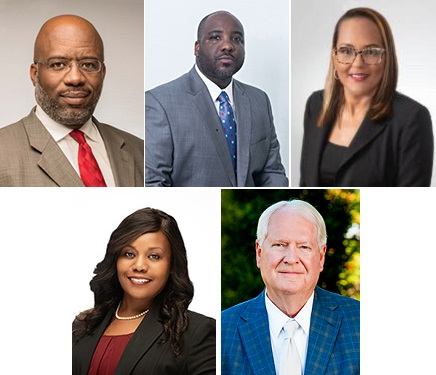Alabama A&M University Trustees Roderick DeWayne Watts, Kevin Ball, and Tiffany Johnson Cole (top row, from left to right). Trustees Scherrie Banks Pickett and Richard Crunkleton (bottom row, from left to right).
Trustees Who Are Overseeing the School’s Handling of the State’s $527 Million Debt to
A&M Are Getting State Money for Private Business Interests That Are Tied to Them
By: Donald V. Watkins
An Editorial Opinion
Financial mysteries are usually solved by following the money. The money that is flowing into the private world of four Alabama A&M University trustees sheds much-needed light on why an underfunded public HBCU has been silent about its efforts to collect the $527,280,064 debt owed to the university by the state of Alabama.
For more than three months, an inquiring Alabama A&M Bulldog Nation has been wondering about the status of $527,280,064 the U.S. Departments of Education and Agriculture say is owed to Alabama A&M by the state of Alabama. These federal Departments notified Gov. Kay Ivey about this debt in a September 18, 2023, letter.
In a letter, dated September 28, 2023, Gov. Ivey essentially disputed this debt. She claims that Alabama A&M is not owed any money because the state has been more than fair in its funding of the school.
Our confidential sources inside the State Capitol in Montgomery tell us the state has no intention of paying this $527,280,064 debt. The same defiant attitude that led the state to resist the creation of a court-ordered second black Congressional district in June of 2023 is now causing the state to challenge the federal government’s declaration that Alabama A&M is owed $527,280,064.
Neither President Daniel K. Wims nor Alabama A&M’s board of trustees has made any public statement about this $527,280,064 debt.
Behind the scenes, however, a five-member executive committee of Alabama A&M’s board of trustees has been interacting with President Wims about this matter and rubber-stamping Wims’ failure and refusal to make a public demand for the full and immediate payment of this $527,280,064 debt.
The executive committee also approved the hiring of a national law firm (MaynardNexsen) to send independent journalists like me a “Cease and Desist” letter demanding that we stop reporting on and editorializing about, Alabama A&M’s failure to acknowledge and/or collect the $527,280,064 debt owed by the state.
This executive committee is chaired by Board Chairman Roderick DeWayne Watts, a staunch Wims supporter. The other four members of the executive committee are Kevin Ball, Scherrie Banks Pickett, Tiffany Johnson Cole, and Richard Crunkleton.
Four of these five committee members have an apparent conflict of interest in this $527,280,064 debt collection matter. These four trustees are helping President Wims and the school’s other governing officials direct Alabama A&M’s actions and inaction in this debt collection matter at a time when either they, or their family members, are getting money from the state for professional services rendered by them or their family’s businesses and, in one case, a salary as a state employee.
Despite their apparent conflicts of interest, these four executive committee members have been making moves in this debt dispute that have the operative effect of advantaging the state of Alabama at the expense of Alabama A&M.
The Roderick Watts Factor: Trying to Faithfully Serve Two “Masters” at the Same Time
Public records on the Open Alabama Checkbook show that Board Chairman Roderick DeWayne Watts’ family has pocketed over $21 million from the state of Alabama since he joined the board in 2017. Yet, Watts is chairing the executive committee that is determining whether Alabama A&M will launch a court fight over this $527,280,064 against the same state government that is making his family rich.
As Chairman of the board, Watts appointed the other four members of the executive committee, which is the governing arm of the full board of trustees for those periods of time between the regularly scheduled 3-4 board meetings per year.
Thus far, Watts’ actions as executive committee chairman have benefitted the state of Alabama and Gov. Ivey, the person who controls the flow of annual multimillion payments to Enrestoration Inc. — his family’s healthcare business.
In 2020 and 2021, Enrestoration also pocketed $1,079,600 from the federal government’s COVID-related Payroll Protection Program (PPP). This money was paid to Enrestoration in two annual installments. The first payment of $539,800 occurred on May 7, 2020, to protect 87 jobs. A second payment of $539,800 occurred on January 26, 2021, to protect 78 jobs.
Oddly, the same $539,800 that was needed to protect 87 jobs at Enrestoration in May of 2020 was needed again seven months later to protect the reduced number of 78 jobs. We have not been able to reconcile why the same amount of payroll money was needed in 2021 for 9 fewer jobs.
What is more, the federal government forgave $542,511 for Enrestoration’s first PPP loan (which includes accrued interest) on November 9, 2020, and forgave $543,504 for the company’s second PPP loan (which includes accrued interest) on October 8, 2021. As a result of this loan forgiveness, Enrestoration effectively pocketed $1,079,600 in free money, courtesy of U.S. taxpayers.
Interestingly, Enrestoration’s PPP loans and loan forgiveness occurred at a time when the company was pocketing $3,477,880.63 in 2020 and $2,600,353.52 in 2021 from the state of Alabama.
Over a seven-year period, the Kay Ivey administration approved $21 million in payments of state funds to a healthcare agency that does not appear to be accredited by any mental health accrediting agency and that had poor business review ratings.
Three Other Executive Committee Members Have Ongoing Financial Ties to the State
Executive committee member Tiffany Johnson Cole, who joined the board of trustees in 2018, has received legal fee payments from the state of Alabama for each year she has been on the board of trustees. Between October and December 12, 2023, alone, Johnson received four payments from the state totaling $3,465.
Committee member Kevin Ball is a member of a prominent South Alabama family that owns and operates a chain of healthcare facilities in Alabama. Ball works for his family’s business. I featured Ball in an October 25, 2023, article titled, “Federal Judge: Alabama A&M Trustee Kevin Ball’s Comments to Female Employee Were Not Appropriate.” The Ball family business has pocketed money from the state of Alabama in four of the last five years. The last reported payment to “Ball Healthcare-Jefferson Inc.” was made on May 11, 2023.
Committee member Scherrie Banks Pickett is an Alabama State Department of Education employee who receives a regular annual salary from the state.
Trustee Richard Crunkleton is the only executive committee member who does not appear to receive any money from the state as a vendor or employee.
The Duty of Trustees to Recuse Themselves Whenever Apparent Conflicts of Interest Arise
Once Gov. Ivey disputed Alabama A&M’s entitlement to the $527,280,064, trustees Watts, Cole, Ball, and Pickett had an affirmative duty to: (a) refrain from participating in any discussions with board members about this disputed debt, and (b) recuse themselves from taking part in any actions/inaction recommended by President Wims, by non-conflicted trustees, and/or by university attorneys regarding this matter. This, they failed to do.
Instead, these conflicted trustees authorized Alabama A&M’s new group of lawyers to threaten inquiring journalists for the purpose of silencing our reporting and editorial voices in this matter.
Meanwhile, the actions of Chairman Watts’ executive committee regarding this $527,280,064 debt remain shrouded in secrecy.
The university’s silence and the executive committee’s secrecy have caused a floodgate of suspicions and raised a host of red flags about Alabama A&M’s efforts, if any, to collect its $527,280,064 debt from the state.
Epilogue
Whenever we follow the money in a situation where a traditionally underfunded HBCU is not aggressively seeking to collect a $527,2280,064 debt owed to it by a solvent debtor like the state of Alabama, either money has usually changed hands or a paralyzing fear has gripped the university’s decision-makers. Nothing else makes sense.
What makes Alabama A&M’s subservient attitude and deferential conduct so concerning in this case is this simple fact: The university’s badge of inferiority manifested itself within three months after the U.S. Supreme Court acknowledged on June 8, 2023, in Mulligan v. Allen that, “Alabama’s extensive history of repugnant racial and voting-related discrimination is undeniable and well documented.”
Against this backdrop, the executive committee’s shroud of secrecy on Alabama A&M’s efforts to collect this $527,280,064 debt smells worse than a freshly opened barrel of one-week-old dead alley rats.
The U.S. Department of Justice in Washington, D.C. needs to conduct a full and thorough investigation into this entire matter. There are too many red flags in this case for an inquiring public that has been intentionally kept in the dark by Alabama A&M.
There is much more coming your way on this sad story after the Christmas holidays. Stay tuned!


